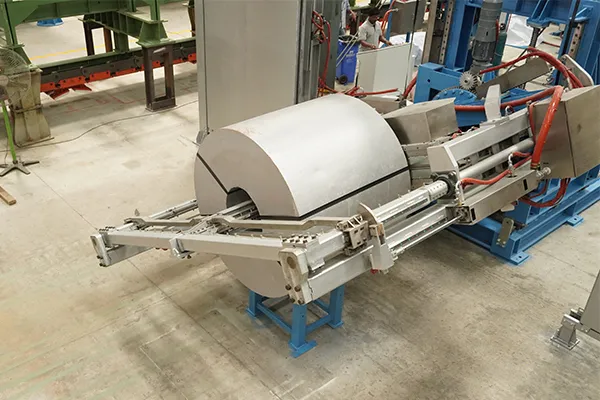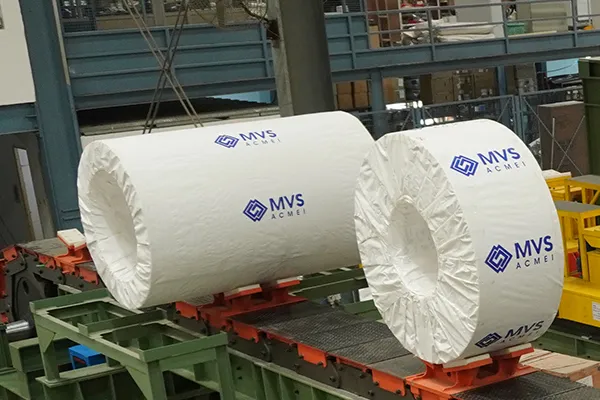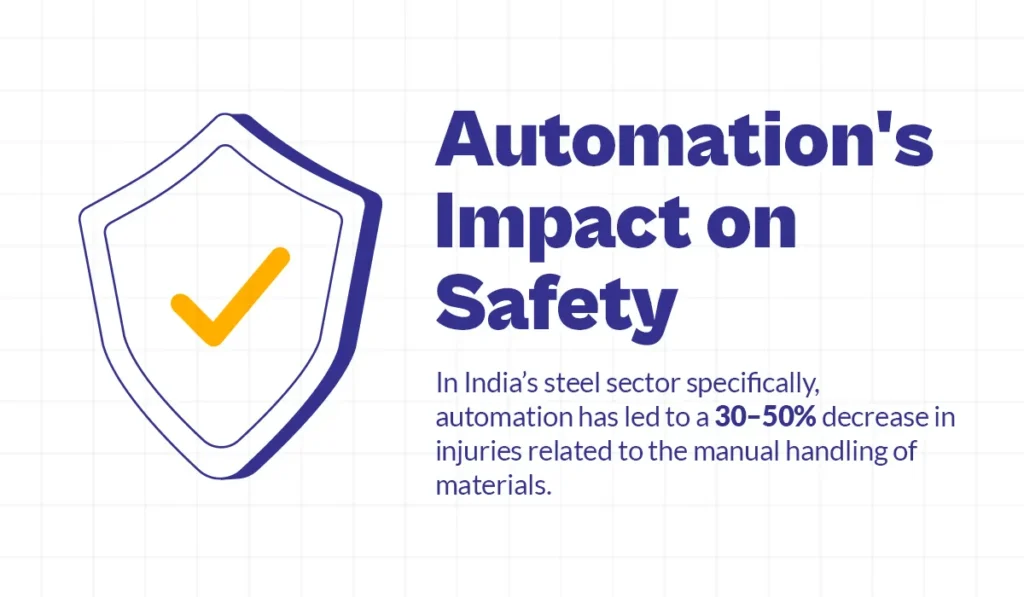
Worker safety is a cornerstone of industrial operations. According to the Ministry of Labour & Employment (India), manufacturing accounts for 20% of workplace injuries annually, many of which are preventable through automation.
Automation has emerged as a transformative solution to address workplace hazards. Automation in Indian industries has proven to be a transformative tool for enhancing worker safety. By replacing manual processes with advanced machinery, companies are not only reducing workplace risks, but also improving operational efficiency.
The Role of Automation in Worker Safety
Automation minimizes human exposure to high-risk tasks by replacing manual processes with advanced machinery. For example, automated strapping and wrapping systems reduce the need for workers to handle heavy coils manually, mitigating risks such as repetitive strain injuries and accidents caused by mishandling. Additionally, workplace dangers in environments such as forging and hot-rolled steel coils, can also be mitigated with correct automation strategies. By automating hazardous operations, MVS ACMEI ensures that workers remain at a safe distance from potential dangers like sparks, fumes, or moving machinery. A report by the International Labour Organization (ILO) revealed that companies adopting automation saw a 40% reduction in workplace accidents within the first year.
Leading Indian Companies have deployed Automation for Enhancing Safety
- Mahindra & Mahindra:
In their automotive manufacturing plants, Mahindra has implemented collaborative robots (cobots) for assembly and material handling tasks. These cobots work alongside human operators, taking over repetitive and physically demanding tasks like lifting heavy components. This reduces the risk of musculoskeletal injuries and ensures workers focus on safer, value-added activities. The company reported a significant decline in workplace injuries after introducing cobots, and their efforts were recognized during the Confederation of Indian Industry (CII) Safety Awards. - JSW Steel:
JSW Steel has integrated automated coil packaging lines across its facilities to eliminate manual handling of heavy steel coils. The company uses robotic arms and automated strapping systems to ensure safe packaging and transportation. This automation has reduced injury rates caused by coil mishandling and improved overall workplace safety. During National Safety Week celebrations, JSW Steel highlighted these advancements as part of their commitment to creating a safer work environment. - Bajaj Auto:
Bajaj Auto, India’s leading motorcycle maker, has teamed up with Danish company, Universal Robots (UR) to drive operational efficiencies across the Chakan (Pune), Waluj (Aurangabad), and Pantnagar (Uttarakhand) plants. Bajaj Auto has adopted automation in its production lines, particularly in welding and painting operations. Robotic systems now handle these tasks, which were previously associated with exposure to harmful fumes and repetitive strain injuries. By automating these processes, Bajaj Auto has not only improved worker safety but also achieved higher precision and quality in production. - Reliance Industries:
Reliance Industries has implemented automated material handling systems in its petrochemical plants to reduce worker exposure to hazardous substances. Automated guided vehicles (AGVs) now transport raw materials and finished goods across facilities, minimizing risks associated with manual transportation. This move aligns with Reliance’s broader sustainability goals and commitment to worker safety.
Key Safety Features in MVS ACMEI's Packaging Lines
At MVS ACMEI, we take pride in offering cutting-edge automation solutions that prioritize worker safety. Here are some specific features integrated into our packaging lines:
1.Automated Strapping Systems:
These systems eliminate manual strapping tasks that often involve sharp edges or heavy equipment. By automating the process, workers are protected from hand injuries and repetitive strain.


2.Transfer System Automation:
Our precision-controlled transfer systems ensure the safe movement of heavy goods, such as steel coils or sheets, without requiring manual intervention. This reduces risks associated with lifting injuries or accidents during transportation.
3.Integrated Safety Sensors:
Our machines are equipped with advanced sensors that monitor operations in real time. If unsafe conditions are detected—such as a worker entering a restricted area—the system automatically shuts down to prevent accidents.
4.Ergonomic Design:
All our automated solutions are designed with ergonomics in mind, ensuring that workers interact with machinery safely and comfortably and are easily trained to do so.
Automation's Impact on Safety

Recognition and Commitment to Safety
Benefits of Automated Packaging Solutions
Compliance with Regulations:
Automated systems help ensure adherence to national safety standards. Automated systems also streamline adherence to global safety standards through real-time monitoring and documentation.
Cost Savings:
Reducing workplace injuries lowers compensation claims, medical expenses, and downtime costs associated with accidents.
Enhanced Productivity:
Automation not only keeps workers safe but also improves operational efficiency by minimizing errors and delays caused by manual processes.
Employee Retention: A safer work environment fosters employee trust and satisfaction, reducing turnover rates and attracting skilled talent.
You need the right talent in the right place
Automation is only as great as the workforce maintaining and designing it. Make sure that you have the right talent in the right place by identifying the roles you need to fill and offering training programs to upskill your current employees.
At MVS ACMEI, we believe that safety is not just a priority—it is a responsibility. By leveraging cutting-edge automation technologies, we create safer workplaces that protect employees while optimizing operational efficiency. Explore our automation solutions to learn how we can help your business prioritize safety today.

